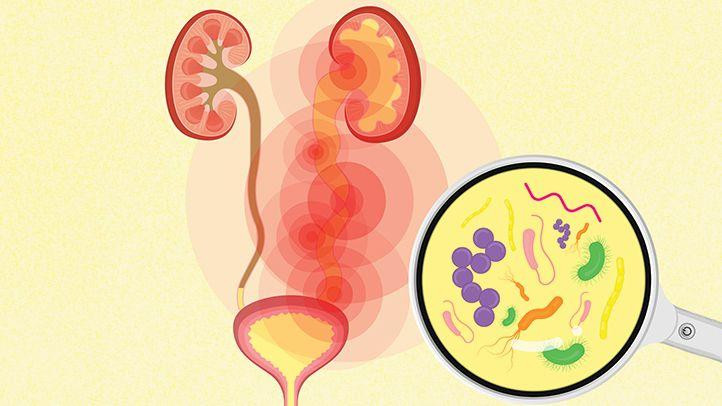What are Uncomplicated Urinary Tract Infections?
A Uncomplicated Urinary Tract Infections (UTI) is considered uncomplicated when it occurs in a otherwise healthy individual who does not have any structural or functional abnormalities in their urinary tract. Uncomplicated UTIs typically occur in the bladder (lower UTI) and are usually caused by bacteria that enter the urethra and travel up to the bladder. Risk factors for developing an uncomplicated UTI include female anatomy that is shorter than males, sexual intercourse and poor hygiene.
Symptoms of Uncomplicated Urinary Tract Infections
The most common symptoms of an uncomplicated UTI are burning pain or discomfort during urination, frequent and urgent need to urinate, feeling of incomplete emptying of the bladder and pelvic pain in females. Some patients may also experience cloudy or foul smelling urine, passing small amounts of urine frequently or having symptoms return after initial improvement with treatment. Fever is generally not present with uncomplicated cystitis but may occur in some cases. Symptoms typically appear suddenly and worsen over 1-2 days.
Diagnosis and Testing for Uncomplicated UTIs
Diagnosis of an uncomplicated UTI is usually made based on presenting symptoms. A urine sample may be analyzed under the microscope to check for white blood cells and bacteria. A urine culture and sensitivity test is not always needed for uncomplicated infections but can help guide antibiotic selection if symptoms do not resolve with initial treatment or recur frequently. A urine dipstick test checks for leukocyte esterase and nitrites which when positive, supports the diagnosis of a UTI. Other tests like blood tests or imaging of the kidneys and urinary tract are not routinely required for uncomplicated infections.
Treatment of Uncomplicated Lower Urinary Tract Infections
Uncomplicated lower UTIs are usually treated with a short 3-7 day course of oral antibiotics like trimethoprim-sulfamethoxazole, nitrofurantoin or fosfomycin that achieve high concentrations in the urine. The choice of antibiotic depends on the susceptibility of the common bacteria seen in the community as per local resistance patterns. The infection generally resolves within 2-3 days of starting the antibiotics. Common antibiotics are effective in over 90% of uncomplicated cystitis cases. It is important to take the full course of antibiotics as prescribed to prevent recurrence or complications from partial treatment. Drinking lots of water and cranberry juice may help flush bacteria out of the urinary tract and alleviate symptoms during treatment.
Prevention of Recurrent Uncomplicated Urinary Tract Infections
Up to 20-30% of women experience recurrent uncomplicated UTIs needing multiple antibiotic courses in a year. Steps that may help reduce recurrences include drinking plenty of water daily to ensure frequent voiding, emptying the bladder soon after sexual intercourse, good perianal and genital hygiene, using feminine hygiene products sparingly and avoiding spermicides and scented tampons or pads. Topical creams containing estriol have shown benefit. For frequent recurrent infections, 3-6 month course of daily low dose antibiotics like nitrofurantoin or trimethoprim may be used. Vaccines targeting most common bacteria are under development.
When to Seek Medical Attention
Patients with uncomplicated UTIs generally improve with standard treatment. However, worsening or lack of resolution of symptoms over 3-4 days of antibiotic therapy may indicate treatment failure requiring evaluation. Other concerning factors include fever over 38°C, severe vaginal pain or irritation, inability to urinate and pregnancy. Patients with recurrent infections or diabetes are also at higher risk of complications and should follow up with their primary care physician. Inpatient treatment may rarely be needed for severely symptomatic infections or in immunocompromised individuals.
Summary
In summary, uncomplicated urinary tract infections are common bacterial infections affecting otherwise healthy individuals, mainly women. Symptoms typically involve the urinary tract and resolve quickly with short courses of effective antibiotics targeting common uropathogens. Preventing recurrences requires lifestyle modification and can involve prolonged antibiotic suppression in select cases. Timely medical evaluation is advised if symptoms fail to improve with standard treatment.
About Author:
Ravina Pandya, Content Writer, has a strong foothold in the market research industry. She specializes in writing well-researched articles from different industries, including food and beverages, information and technology, healthcare, chemical and materials, etc. (https://www.linkedin.com/in/ravina-pandya-1a3984191)
*Note:
1. Source: Coherent Market Insights, Public sources, Desk research
2. We have leveraged AI tools to mine information and compile it

